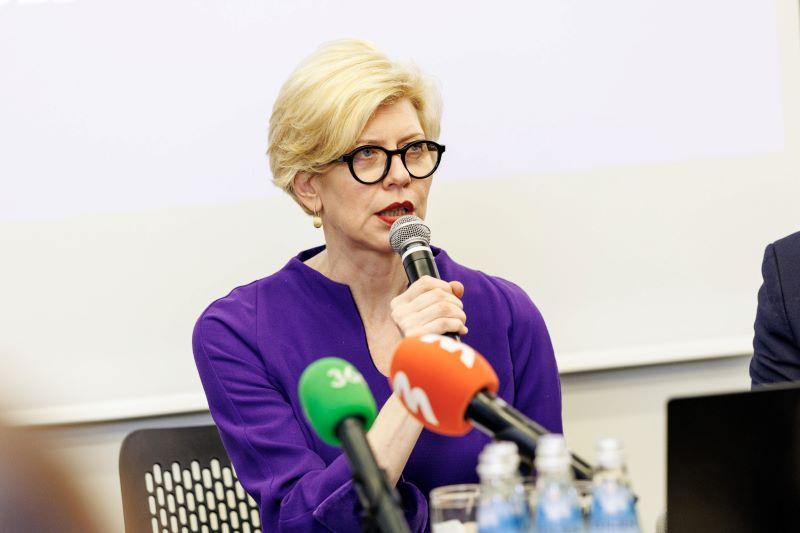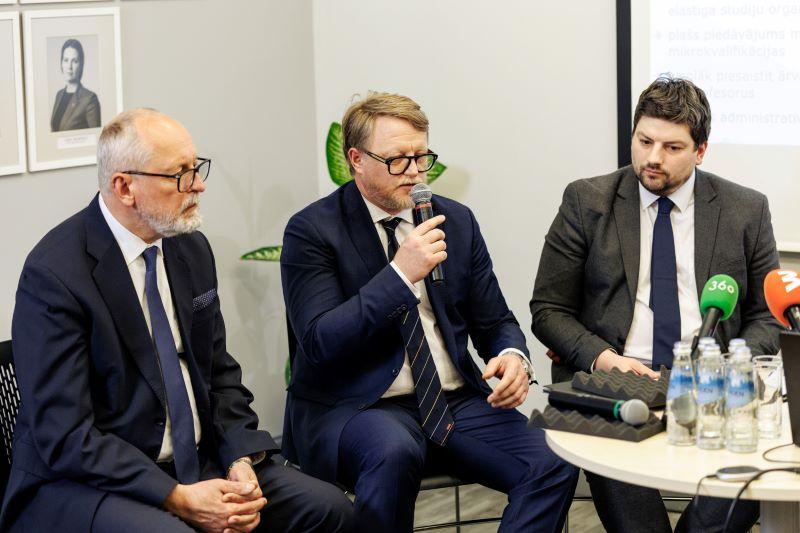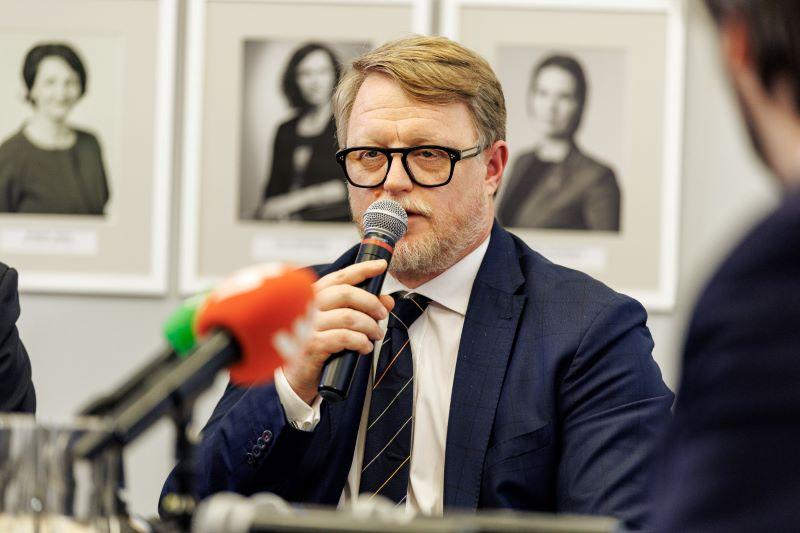Latvian higher education institutions modernise study solutions. RSU participates in Ministry of Education and Science press conference
Photo: Courtesy of Toms Norde
By the end of 2029, institutions of higher education in Latvia will implement an extensive modernisation process of study solutions. The Study Process Digitalisation initiative will be carried out in two phases with the support of European Union (EU) funds and will cost a total of 33.4 million EUR. By introducing digital solutions into higher education processes, Latvian students will have access to the same modern and flexible studies as at leading European universities and colleges.
The modernisation process will significantly improve the management of studies by offering flexible course selection (including across faculties, universities and even in other European countries), introducing e-diplomas, promoting lifelong learning and moving towards "paperless" processes. This process will also include four study support systems: integrated digital resource and library management with advanced AI support for search and content processing, modern student internship management, assessment of the study process and management of the use of personal data in student research. These solutions will provide a more efficient and contemporary approach to education management.
‘Latvia's competitiveness and prosperity will be determined by our ability to make comprehensive use of new technologies, including the intensive digitalisation of higher education.
This is a priority for European universities, and we will implement solutions in Latvia too, adopting best international practice. Our goal is to provide all young people with a competitive education and a personalised approach to development, and adults with opportunities to effectively upgrade their qualifications throughout lifelong learning,’ says Minister for Education and Science Anda Čakša.
A comprehensive modernisation of the study solutions will take place between autumn 2025 and the end of 2029. It will open up a wide range of opportunities for students, higher education institutions and society at large, creating the basis for a modern, efficient and innovative higher education system.
The study process digitalisation initiative will be implemented in two phases. The first phase (23.4 million EUR) will be jointly executed by the Higher Education and Science Information Technology Shared Service Centre (Vienotais pakalpojumu centrs - VPC) founded by four research universities: the University of Latvia (UL), Riga Technical University (RTU), Rīga Stradiņš University (RSU), and the Latvian University of Life Sciences and Technologies (LBTU). The VPC is a joint association of these four science universities, with the aim of designing and developing innovative solutions that promote the growth of all universities and support the comprehensive development of science and higher education in the country. VPC members represent 66% of all students in Latvia or approximately 49,200 students.
The Ministry of Education and Science provides funding for the modernisation of studies, develops and improves regulations to modernise study services in cooperation with VPC and supervises project implementation. This will benefit not only specific institutions, but the entire Latvian higher education and science space, contributing to its international competitiveness and sustainable development.
The second phase, with a total funding of 10m EUR, will provide grants to implement new solutions across all universities, ensuring that they are effectively integrated. All Latvian universities and colleges that apply for grants individually or in cooperation will be eligible for funding, promoting innovation and digital change in the higher education system.
UL Vice-Rector for Research Assoc. Prof. Guntars Kitenbergs explains: ‘Digital technologies are an integral part of our daily lives. Booking tickets or applying for services on a smartphone and using e-documents has become common. The activities under the study process digitalisation initiative will enable the Latvian higher education environment to take the next leap forward. We will be able to offer new study and research experiences for students, lecturers, and researchers. In the future, diplomas and micro-credentials will be readily accessible in a digital environment. It will be easier to personalise one's study path, for instance, by selecting courses from an easily accessible catalogue of study programmes and courses. At the University of Latvia, we recognise the importance of such solutions, as UL has long been ahead regarding the number of users we have of our digital study solutions.’
RTU Rector, Prof. Tālis Juhna states: ‘Our primary clients and partners are students, which is why we need to improve the internal processes of our universities to ensure that students have the most convenient and modern study environment and that research universities have simplified opportunities for collaboration. Digital solutions will allow us to work even more efficiently so that Latvian research universities can position themselves more confidently in the global higher education environment and compete with other internationally acknowledged universities.’
RSU Rector, Prof. Aigars Pētersons notes: ‘The digitalisation reform is a significant step in developing higher education in Latvia, with students at its centre.
Rīga Stradiņš University has already accumulated valuable experience in this field – we provide modern digital infrastructure on an international scale.
During the Covid-19 pandemic, RSU was the first to move to entirely remote learning within a month, thanks to efforts that had been made earlier in regards to digitalisation. This reform will not only expand opportunities for students and improve the quality of studies, but will also allow all universities to collaborate, reduce costs and strengthen our competitiveness in the international environment. There is strength in collaboration and together we are shaping the future of education.’
The Rector of LBTU Prof. Irina Arhipova emphasises: ‘Modern digital solutions, their unified implementation in Latvian universities, and data exchange with all European universities is a meaningful direction for developing higher education. This will enable more efficient management of various processes and strengthen international competitiveness. One cannot imagine the study process at the LBTU without close cooperation with employers, therefore the unified internship management system is of particular benefit to LBTU. It will help students easily find the most suitable internship for their interests. Equally important is the unified student identification system, as well as the survey and evaluation module, providing the opportunity to quickly gather student feedback on various issues while saving university resources.’
With digitalised and student-centred higher education, Latvia will strengthen its position in the international education and science ecosystem.
About the EU-Funded Initiative
The study process digitalisation initiative aims to implement shared digital solutions to modernise study management systems and processes, promote a student-centred and flexible study experience, and enhance the competitiveness of Latvia's higher education institutions.
This initiative falls under the European Union's Specific Objective 4.2.2 To improve the quality, inclusivity, efficiency, and relevance of education and training systems for the labour market, including validating non-formal and informal learning to support the acquisition of core competencies such as entrepreneurship and digital skills, and facilitating the implementation of dual learning systems and apprenticeships. The incentive Digitalization of Study Process (4.2.2.11) is part of this objective.
























